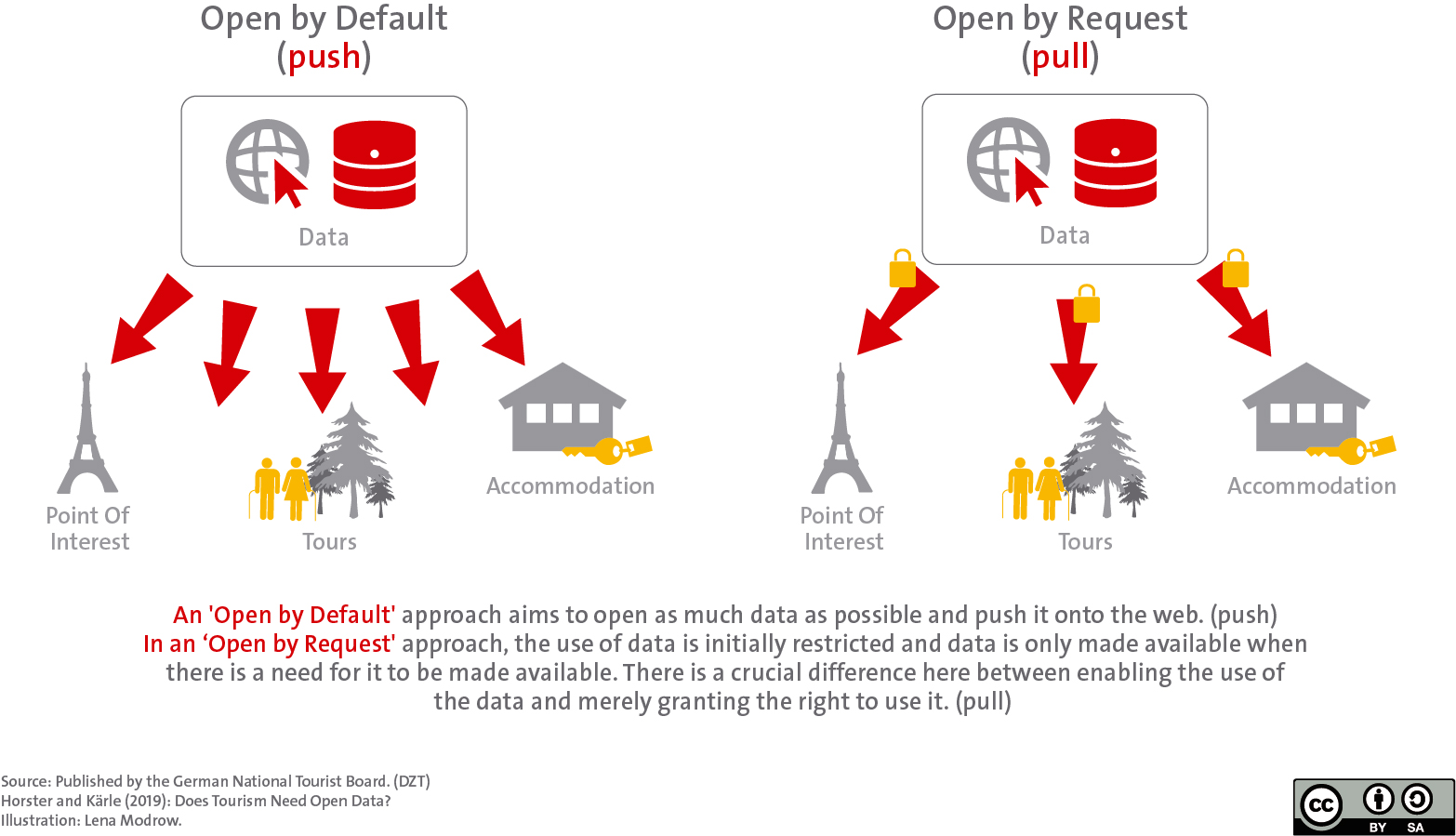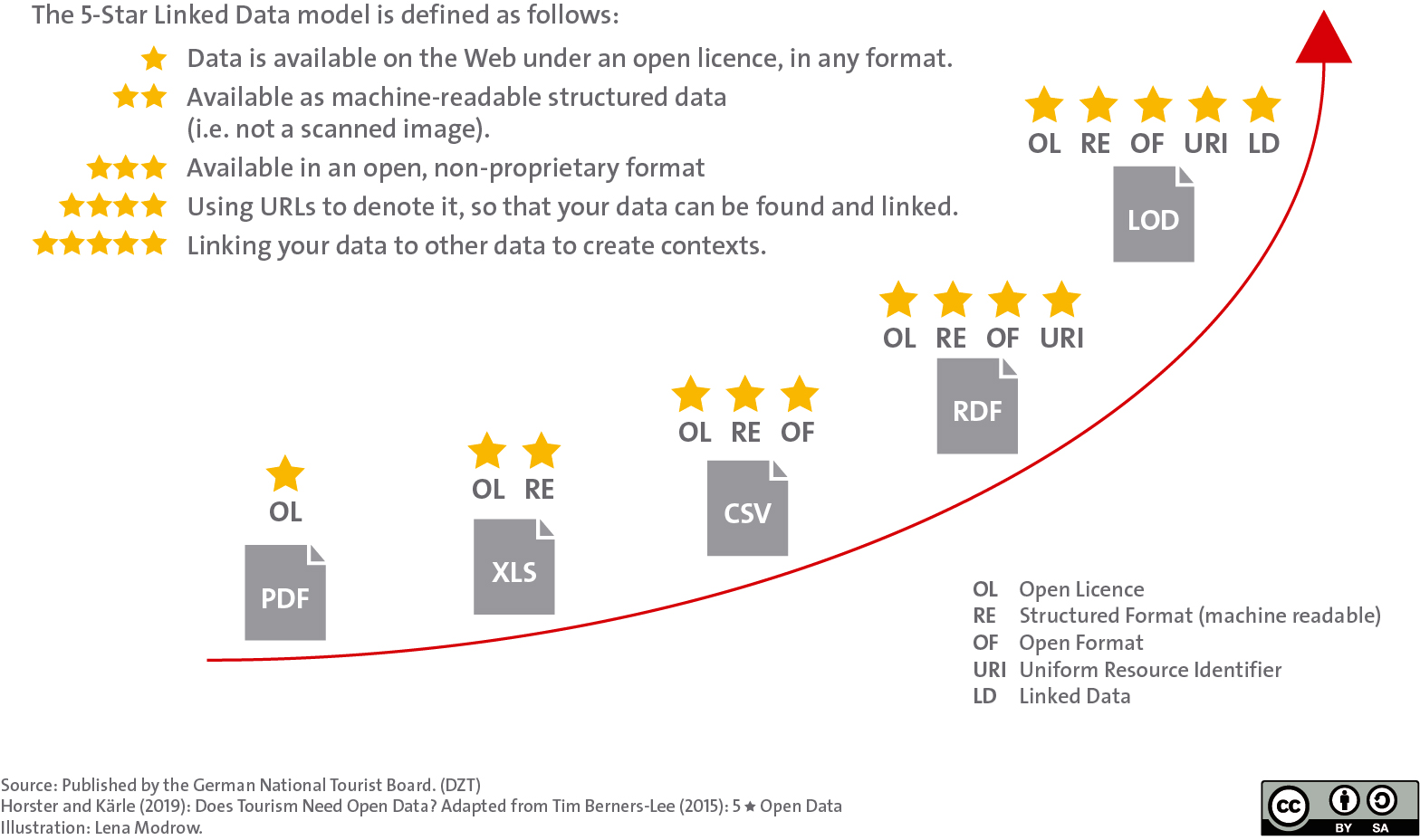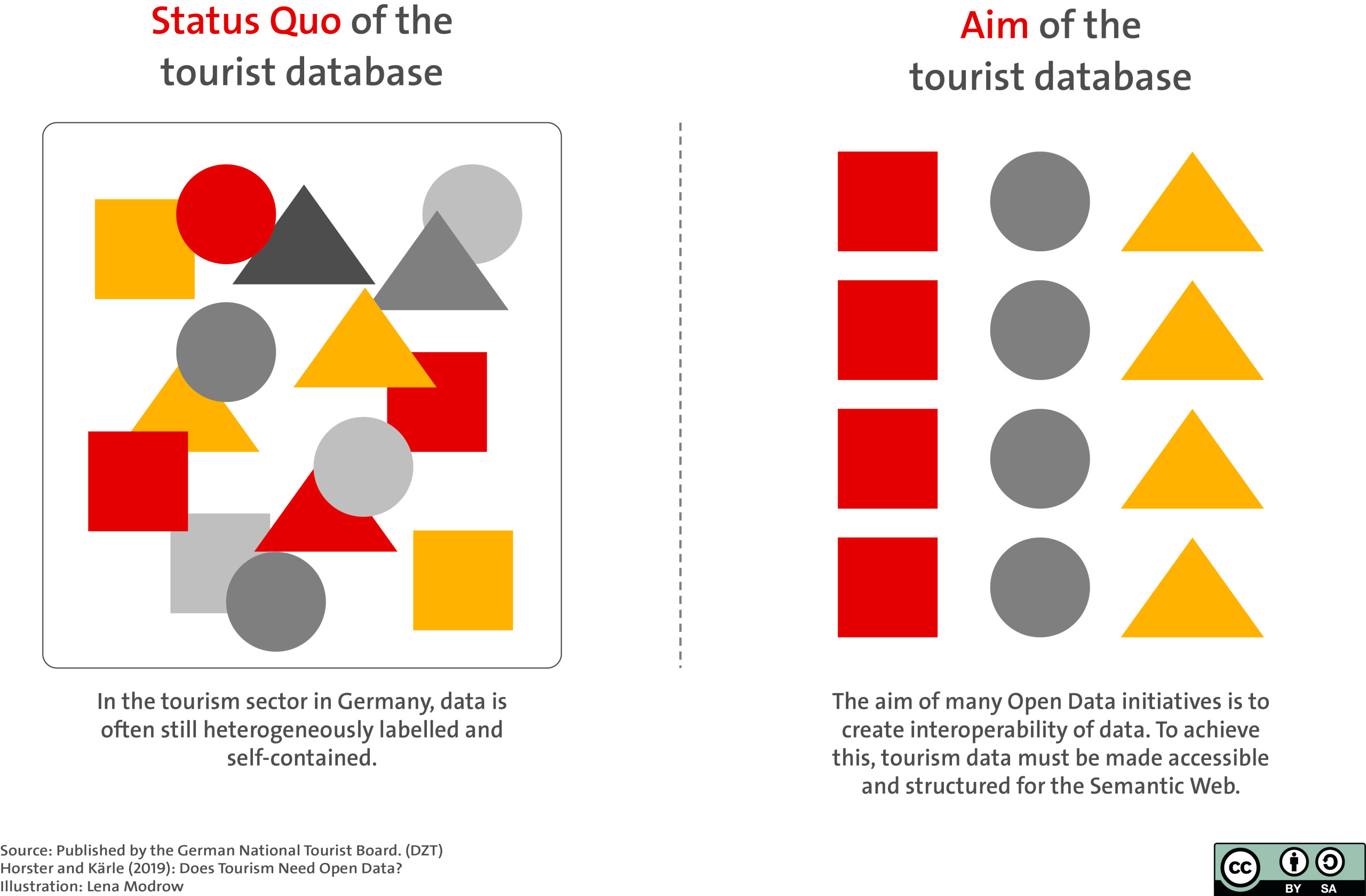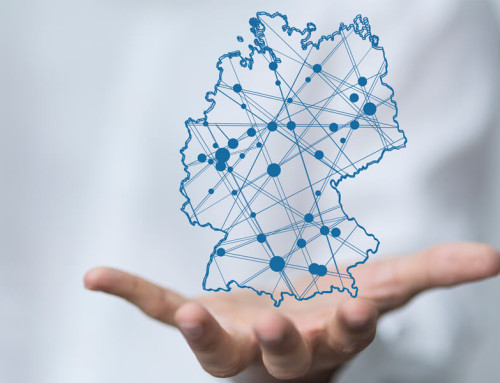Views put to the test.
Open Data as an attitude.
The debate about Open Data is initially less about technical issues and more about negotiating mindsets. How “open” can, should or may data be provided?
Basically, three levels can be differentiated here:
It is therefore necessary to define on a case-by-case basis which data should be shared for which purpose. The greater goal is to offer as many stakeholders as possible the opportunity to use the information, in each case under the given framework conditions. The basic idea in tourism is that the guest should be able to find up-to-date and correct information in as many (digital) places as possible. There are two different approaches to deciding whether to open up the data.
On the one hand, an “open by default” approach. Here the basic attitude is to open as much data as possible and push it to the web. Data is closed if there are conclusive arguments why the data should not remain open. On the other hand, there is the “open by request” approach. Data usage is initially restricted and is only opened when there is a need for it to be opened.
The use of the data must therefore be actively requested. The latter approach considerably restricts the dissemination of data because it is difficult or impossible to see which database is available (the data is not accessible or only accessible to a limited extent). Therefore, there is a crucial difference, and one that should not be underestimated, between allowing everyone to use the data and merely granting the right to use it when requested.
Flexibility and Data Accountability
The pressure to open data is also and increasingly rising by the Open Data debate on a political level. In the case of government and administrative data (Open Government), this is particularly a matter of opening up data sets that are financed by taxpayers’ money. In this context, data from DMOs, the production of which was financed by subsidies, are also sometimes under discussion.
The advantage of opening up, apart from this “ethical obligation”, is that data can be exchanged flexibly. The question of whether and how open data may be reused becomes obsolete with a consistent implementation of Tim Berners-Lee’s 5-star model. Voice assistants such as Alexa or the Google Assistant can thus “fetch” data directly from those who provide the data.
At the same time, the entity providing the data loses control over how the data is used. The arguments against opening up are therefore, on the one hand, that the simplified accessibility of the data could lead to data being falsified unintentionally or intentionally (violation).
In addition, particularly image and video materials can be used in a different context than the original intention – which is less the case with data on the opening hours of a swimming pool or similar basic information.
Reach and Business Models
By opening up (tourist) data, the reach of this can be increased. Data can thus be used and played out beyond the output on one’s own website or a regional app. This reuse applies to both large platforms (Google, GetYourGuide, Airbnb, etc.) and startups developing niche applications. Often, region-specific data is directly or indirectly linked to applications and/or business models of the DMO. The fear is that opening up the data to everyone will be accompanied by a loss of relevance of their own channels. This is a possible consequence, but not necessarily a negative one.
Because in the meantime, the strategic goal is often to prepare the data for one’s own channels as well as for all others in a way that the visibility of these on the web as a whole is as high as possible – regardless of the output channel or the relevance of the individual channel. Thus, the choice of channel is left to the guest. The focus is then on providing high quality, accurate and up-to-date content about your destination on the web. Whether such a step is possible for the respective region should be answered in consensus with the local protagonists. However, the data that is already available on the major platforms can also be processed in such a way that it can be used by everyone. This requires semantic tagging of the data and making it available on the web using an output format such as JSON-LD.
Innovations and Information Brokers
But open data also provides the basis for digital innovation. Semantic markup (via schema.org) is used to create data interoperability, which makes it interesting for many application areas. For startups, such an openly available database provides an important basis for the development of digital services. The DMO can thus become an incubator for (regional) innovation by providing open data. If the start-ups are located locally, the DMO outsources its own services and acts in the figurative sense in the role of a regional economic development agency. In view of the increasing digitalisation of destinations themselves, there is a particular need for consistent labelling of data with a local reference (POIs, tours, etc.).
Due to these developments, however, the role of the DMO must also be questioned. One role may be that of an information broker. This is equivalent to a separation of data preparation and service development and can be understood as a division of labour and tasks, which can consequently also represent a relief for the DMO, which then no longer has to be responsible for the further development of apps and other digital services.
However, the fact that the data is also used by external providers after processing is not a foregone conclusion. Therefore, it should be questioned which data can be interesting on the market and for guests and what kind of applications can be developed from it, so that the work on data quality is also in due proportion to its effort and, above all, also has a concrete application reference. This is highly relevant because those who maintain the data then see a direct impact of their time invested.
Synergies and Additional Costs
Due to the work involved in opening the data, there are additional effects. While the data is currently very heterogeneous in individual database silos, the goal is not only to open up these databases in terms of licensing law, but also to make them available in such a way that it is possible to use the data (interoperability).
The current additional costs can therefore pay off if this process is carried out consistently. If the data stocks of a destination are then available in such a way that they can be used interoperably, this can lead to the elimination of duplicate management and the exchange of data with cooperation partners and neighbouring DMOs.
One Web for All
In the medium to long term, therefore, Open Data can lead to the existence of an open and machine-readable database that is available to all, in addition to the databases on the large and currently dominant platforms. Whether the data will then be used by others, however, cannot be guaranteed a priori. Therefore, at least only the data quality increases on the big platforms. Depending on the perspective, however, even this effect would not necessarily be negative.
It can be summarized that strategic questions and work are connected with the opening of the data according to licensing law as well as their semantic labelling, which have to be clarified. Due to this complex and long-term implementation and realisation period, the question could now be asked whether the “hype” around Open Data will not pass again. Tim Berners-Lee (inventor of the World Wide Web) pinpoints the opposite in a beautiful quote:
“Data is a precious thing and will last longer than the systems themselves.”
Eric Horster
West Coast University of Applied Sciences
Eric Horster ist Professor an der Fachhochschule Westküste im Bachelor- und Masterstudiengang International Tourism Management (ITM) mit den Schwerpunktfächern Digitalisierung im Tourismus und Hospitality Management. Er ist Mitglied des Deutschen Instituts für Tourismusforschung.
Mehr zur Person unter: http://eric-horster.de/
Elias Kärle
University of Innsbruck
Elias Kärle ist Wissenschaftler an der Universität Innsbruck. In seiner Forschung beschäftigt er sich mit Knowledge Graphs, Linked Data und Ontologien. Als Vortragender referiert er meist zur Anwendung und Verbreitung semantischer Technologien im Tourismus.
Mehr zur Person unter: https://elias.kaerle.com/

















